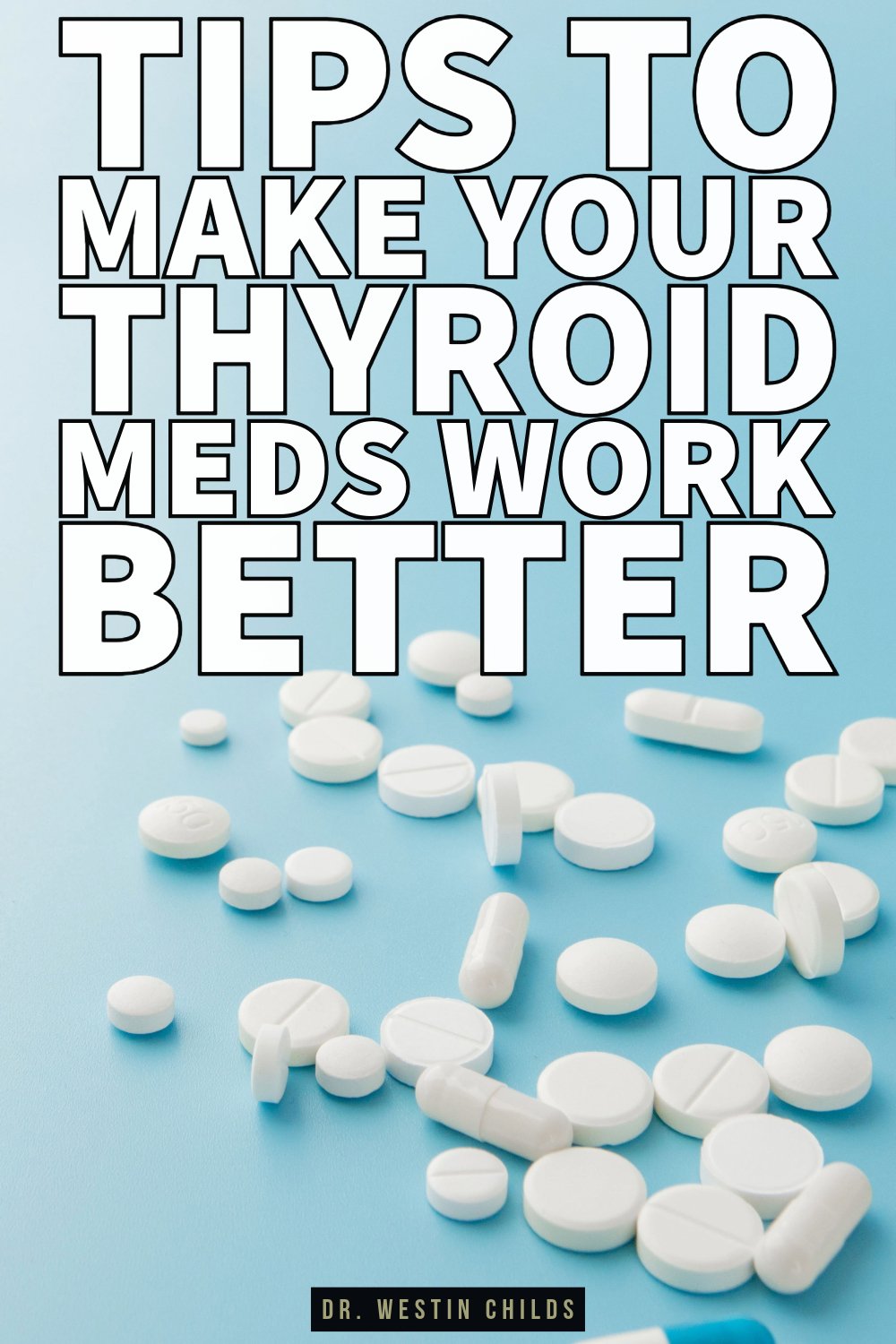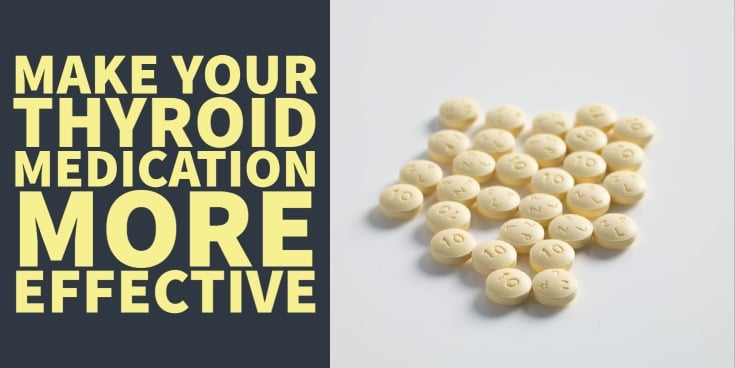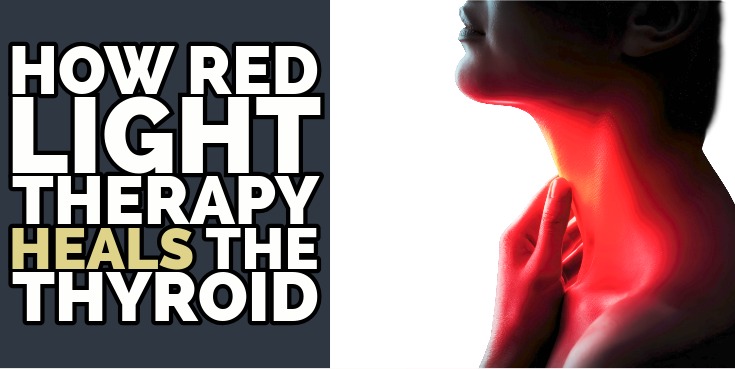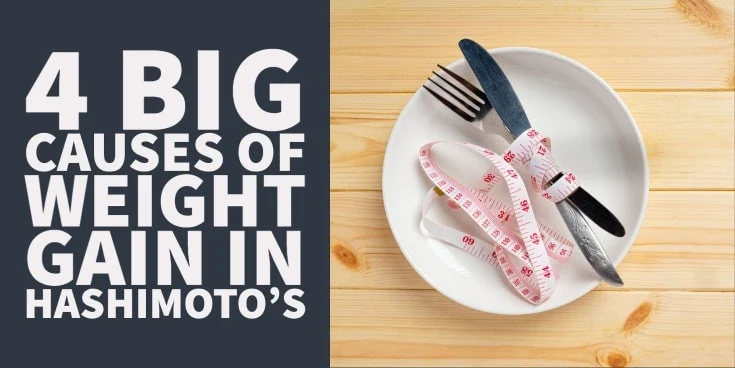Ok, here’s the deal thyroid patients:
I know that many of you are frustrated and feel that you are at the mercy of your doctor for how you feel day to day.
But the truth is, you aren’t.
This may come as a shock to some of you while other patients may know exactly what I am talking about.
Here’s what I mean:
While it is true that you are at the mercy of your doctor when it comes to your thyroid medication including things like what type of thyroid medication you take and what dose you are taking, you still have complete control over other aspects of your life which help regulate and control your thyroid.
There are still many things within YOUR power that you can change or adjust or take that can make your thyroid medication even more effective.
It doesn’t matter if your doctor has you on levothyroxine and simply won’t entertain a conversation about swapping over to Nature-throid or liothyronine.
It doesn’t matter if your doctor is underdosing you on levothyroxine.
And it doesn’t matter if your doctor is unwilling to order tests beyond the TSH.
There are still things that you can do to impact your thyroid medication.
And we are going to talk about just that.
Today you will learn:
- What to do when your doctor isn’t willing to budge on adjustments to your thyroid medication
- How supplements can naturally how well your thyroid medication is working and converting
- How making simple changes to when you take your thyroid medication can impact how well your thyroid medication works
- How to ensure that you are getting as much thyroid medication into your body as possible through your gut
- And more…
Some of these you may be aware of, and others may be completely new to you so make sure you read ALL of them.
Let’s jump in…
#1. Increase How Well Your Body is Converting T4 to T3 with Supplements
The first thing you should focus on is something called T4 to T3 conversion.
T4 to T3 conversion is the process where your body takes the inactive thyroid hormone T4 and turns it into the active thyroid hormone T3.
This process is often neglected by both doctors and patients even though it’s probably the single most important aspect of thyroid function.
If you are taking a thyroid medication such as levothyroxine then this process is even more important.
Why?
Because medications like levothyroxine (as well as Tirosint, Synthroid, and Levoxyl) only come with T4 thyroid hormone.
This means that these medications are NOT active when you take them by mouth.
And in order for your body to use them, they must first be activated.
This is one of the primary reasons that thyroid patients who use these medications do not feel well.
How can a medication do its job if your body can’t use it?
It’s something that should be obvious but, as I mentioned, is often overlooked by doctors.
The good news is that there are things that you can do to enhance how well this process is working.
There are several supplements, nutrients, and ingredients that you can take by mouth and in supplement form which help this process.
In other words, taking certain and specific supplements can improve how well your body uses and metabolizes your thyroid medication.
If you can brute force your body into activating the T4 thyroid hormone found in your levothyroxine and turn it into T3 then your thyroid medication will be more effective.
So how can you do this?
There are many nutrients involved in this conversion process but some shine more brightly than others.
My personal favorite nutrients include zinc, selenium, guggul, and rosemary extract.
You can take each of these supplements individually and put them together or you can use a supplement such as this one which has all of the ingredients you need to enhance T4 to T3 conversion.
This is a powerful way to enhance your thyroid medication because supplements are available over the counter which means you do NOT need a prescription to get them!
#2. Change WHEN you Take your Thyroid Medication
What many thyroid patients don’t realize is that the time of day that they take their thyroid medication can impact how well their medication works.
You have probably been told to take your thyroid medication first thing in the morning away from food, right?
This is antiquated advice.
The reason doctors and pharmacists recommend taking your thyroid medication first thing in the morning is because they want you to take it on an empty stomach.
While it is true that these things may interfere with your thyroid medication absorption there is nothing magical about taking it first thing in the morning nor is it required.
It’s not as if taking your thyroid medication at another time of day will suddenly render it inactive or make you turn into a pillar of salt.
In fact, it’s the opposite.
It’s fine to take your thyroid medication at any time of the day so long as you take it appropriately (more on this to come).
It turns out that there are other times that may be more beneficial than taking your thyroid medication first thing in the morning.
One of those is taking it RIGHT before you go to bed at night (1).
Taking your thyroid medication right before you go to bed usually allows you to take it on an empty stomach because most people don’t eat right before bed.
In addition, your gut function is slower in the evening than it is in the morning.
For reference, there is a reason that most people have bowel movements first thing in the morning…
Because this is the time that your gut is most active.
Most people aren’t in the habit of waking up in the middle of the night to have a bowel movement which is a big plus for those who take thyroid medication.
Taking your medication at night means that it stays in your gut longer which means you can extract as much as possible from your dose.
This means that your dose of thyroid medication is more effective even without adjusting the dose.
#3. Improve how well Thyroid Hormone Works at the Cellular Level
Another aspect of thyroid function that you need to be aware of is something referred to as thyroid hormone cellular sensitivity.
Like thyroid conversion, this is another often ignored aspect of thyroid function that is very important.
Thyroid cellular sensitivity refers to how sensitive your cells are to the thyroid hormone that they encounter.
If you’ve read any of my other blog posts then you probably know about hormone-resistant syndromes.
These are syndromes in which your body (and cells) become resistant to the very hormones that they are supposed to interact with!
When this happens with insulin it’s called insulin resistance and the result in high blood sugar.
When this happens with leptin it’s called leptin resistance and the result is weight gain.

When this happens with progesterone it’s called progesterone resistance and the result is estrogen dominance.
Well, the very same thing can happen with your thyroid and if it does, it’s called thyroid resistance.
Obviously, if your body is resistant to thyroid hormone you are going to have a problem.
If thyroid hormone can’t interact with your cells then it can’t do its job and you will feel it.
This can occur even if you take all of the necessary steps to ensure that your thyroid medication is getting absorbed and converted!
So what are you supposed to do?
You can brute force cellular sensitivity by using certain over-the-counter supplements.
The two most important include vitamin A (2) and vitamin E (3). These vitamins are important because they are fat-soluble vitamins.
We care that they are fat-soluble because that important detail means that many people are likely deficient in one or both of them.
Unlike water-soluble vitamins, there is a small risk of toxicity when taking fat-soluble vitamins so many manufacturers of these supplements intentionally underdose them.
It’s a “cover your butt” move that happens to have a negative impact on thyroid patients.
You can easily take Vitamin A and Vitamin E, though, to replace your levels and improve this process.
I would recommend checking out a supplement such as this which combines Vitamin A and Vitamin E together along with other important thyroid nutrients all designed to help your thyroid function optimally.
Feel free to get a different supplement, though, but make sure you find one with comparable A and E levels.
#4. Focus on Gut Health to Increase Thyroid Medication Absorption
Ahh, gut health. It’s just something that you can never really escape.
It’s important for just about all health conditions including thyroid function.
For the purposes of this article, we care a lot about gut health because it is the site of thyroid medication absorption.
Any sort of issue in your gut can severely limit how much thyroid medication you swallow by mouth actually gets absorbed in your gut.
This is important because you could be doing everything else right but it doesn’t matter if that medication won’t make it into your body.
Imagine, for a second, that you are taking 100mcg of levothyroxine.
If you have problems in your gut, you may be losing out on a huge portion of this medication because it can’t get absorbed.
If that portion is a little as 20% then that means you are only getting 80mcg of your 100mcg dose into your body.
Treating your gut can help you extract more of your thyroid medication to ensure that it actually makes it into your body.
In this way, targeting your gut can indirectly make your thyroid medication more effective.
Not because it’s doing anything special to the medication itself but because it is helping your gut absorb as close to 100% of whatever dose you are taking.
Gut health is particularly important to thyroid patients because they tend to have many gut-related issues.
By virtue of how thyroid function impacts gut function, you are set up to develop inflammatory gut conditions such as small intestinal bacterial overgrowth, fungal overgrowth, acid reflux, leaky gut, and intestinal dysbiosis.
The first step to treating your gut is to identify whatever conditions you may have and then treat those issues.
If that sounds daunting then another easy first step is to use daily probiotics and/or prebiotics which can go a long way to helping balance gut function.
#5. Stop Taking Medications that Prevent Your Thyroid Medication From Working
We’ve been talking a lot about different ways that you can increase the effectiveness of your medication through direct means.
You can increase how effective your thyroid medication is by focusing on absorption, by focusing on thyroid conversion, by focusing on your gut health, and so on.
These are, in a way, like pressing down on the gas pedal.
Now let’s talk about lifting up on the brake.
One way to do this is by taking a hard look at other prescription medications that you may be taking in addition to your thyroid medication.
It may surprise you to know that many prescription medications have a negative impact on thyroid function.
They can cause issues with your thyroid lab tests, they can directly inhibit thyroid function from the thyroid gland, and they can also limit thyroid medication absorption.
Unfortunately, many doctors aren’t aware of the negative interactions that can occur with prescription medications.
There are a LOT of these medications that can cause problems so I won’t list them in this article but I would highly recommend that you see the complete list here.
If you are taking any other prescription medications then please see that article.
It may sound like a complicated issue but it’s actually quite easy to fix.
There are usually many different types of medications that can be used to treat any given condition.
So, for instance, if your blood pressure (4) medication is interfering with your thyroid function then simply switching to a different type of blood pressure medication should do the trick.
#6. Make Sure You Take Your Thyroid Medication Correctly
Lastly, you want to make sure that you are taking your thyroid medication correctly.
It may sound obvious and you probably think you are taking it correctly but many thyroid patients find that they aren’t.
Just double-check this list here to ensure that you are doing everything in your power to ensure maximum absorption of your thyroid medication:
- Take your thyroid medication either first thing in the morning or right before you go to bed
- Take your thyroid medication at least 30-60 minutes AWAY from food (either before or after)
- Do NOT take supplements at the same time as your thyroid medication, take them at least 30-60 minutes away from whenever you take your thyroid meds
- If you are taking a dedicated calcium (5) or iron (6) supplement then make sure to take your thyroid medication 4 hours away from whenever you take these supplements
- Do NOT take your thyroid medication with coffee (7) or caffeine
If you find that you are not following these rules then make some changes! It might surprise you how you feel afterward.
Final Thoughts
This list is designed to help YOU as a thyroid patient feel better and take control of your health.
Each of these things may help increase the effectiveness of your thyroid medication which may help you feel better.
These things do NOT require a prescription and they can be done alongside other therapies that you may already be doing.
It also helps put some of the responsibility of thyroid management in your hands which can be powerful.
Remember:
No one cares more about your health than you do! If you put the responsibility of your health on your doctor then don’t be surprised if you don’t feel better.
Now I want to hear from you:
Did any of the things on this list surprise you?
Were you already aware of these things?
Did any catch your eye? Are you planning on implementing any of the strategies listed here?
Leave your questions or comments below!
Scientific References
#1. https://pubmed.ncbi.nlm.nih.gov/21149757/
#2. https://www.ncbi.nlm.nih.gov/pmc/articles/PMC5551430/
#3. https://pubmed.ncbi.nlm.nih.gov/9537635/
#4. https://pubmed.ncbi.nlm.nih.gov/2866611/
#5. https://www.ncbi.nlm.nih.gov/pmc/articles/PMC3092723/
#6. https://pubmed.ncbi.nlm.nih.gov/25040647/
#7. https://pubmed.ncbi.nlm.nih.gov/19942153/











Hello Dr Child’s
What caught my eye was taking the Levothyroxine at night instead of the morning. Maybe I’m not getting it into my gut. I took my thyroid test they had to reduce my medication a little and said my cholesterol was a little high and to watch the bread, dairy, sugar I do try watching these foods I feel I ate eggs a lot because I heard they were good for my thyroid so I had eggs, avocado , apples for breakfast because I was trying to stay away from crabs to watch my weight but now I study that I need to eat more so I started a 1400 calories daily low carbs a since they said last my cholesterol went up I’m watching that now taking less. I had been taking spoon fulls of coconut oil because study show good for thyroid but study also show not good and that could have what raised my cholesterol between the eggs, coconut oil, and I was eating bacon in the air cooker too so now after all of that I have been walking I’m eating 1400 Calories daily and eating lots of green leafy salad , avocado, I throw a few pinto beans in with apple pieces. Is Cheerios okay with almond milk the Cheerios have 27 or 29 carbs I’m trying to get it right I stop taking my vitamins because I don’t know if they are right i do need your help I will try my medication before bed it’s only medication I take.
Sincerely Linda
I ordered the thyroidectomy bundle. I am having trouble keeping my blood sugar down. Do you think these supplement will help with that. I did not have high blood sugar until thyroid surgery. Also I have cramps I legs in night and neck and sides but some better since my dr increase my NP thyroid meds. I have a tremor that has also developed in last two years. Isn’t that thyroid related? Please answer my questions.
Hi Judy,
If you optimize your thyroid it will have an impact on your blood sugar. You may also want to check out some of my other supplements which more directly impact blood sugar levels such as these:
https://www.restartmed.com/product/berberine-500/
https://www.restartmed.com/product/glucoslow-fiber/
Hi Dr Childs,
This makes sense about taking thyroid medicine at bedtime, especially if it is T4, but I am afraid that taking my T3 (liothyronine) will keep me awake because it is the active form. Do you even advise T3 at night? I was told to only take it first thing in the morning with a second dose at one pm.
Thank you for all you do!
I am very interested in your question Leena. I also split my 25 mcg of liothyronine. I have never found it to keep my awake, but always wonder if it is more effective to take during the day? Looking forward the the reply from Dr. Childs. I have been following him for a very long time.
Hi Robin,
The truth is that thyroid medications can pretty much be taken at any time of the day and I’ve seen people prosper on all sorts of dosing schedules. The key is to find what works for your body.
Hi Leena,
T3 does have the potential to keep someone up at night but it’s actually quite rare. Most people can take T3 before bed without any issue.
Hello,
Guggul is a new nutrient to me and I am wondering what you would say about reviews of some that take it that has resulted in hives, itching and even breathing issues. Is it a matter of dose? Thank you. Love all the info you have and share!! Thank you so much.
Hi Beverly,
Guggul is in my #1 selling product, T3 conversion booster, so I’ve had the advantage of using it on tens of thousands of people. The symptoms you’ve mentioned here are certainly not frequent and I would say they are incredibly rare and most likely dose dependent.
I take progesterone at night before bed. If I switch my thyroid meds from morning to nighttime, can Ii take them at the same time as the progesterone?
Hi Marlene,
If you are talking about progesterone cream then it doesn’t matter. If you are talking about oral progesterone then it does matter and you wouldn’t want to use them together.
Im taking
progesterone orally
Lio and levothuroxine
your T3 conversion booster
Would you please advise as to the optimum times to take these?
Im also about to re-purchase your Leptin Resistance supplement.
I intermittent fast with a 16/8 eating window. Cannot lose weight!
Thank you! Love your helpful information!
Hello Dr. Childs,
I recently had my blood work done for thyroid and hormones.
I am 54 years old and had a thyroidectomy when I was 29 years old for nodules on my thyroid. I have not gone through menopause yet but going through perimenopause symptoms. I have always been estrogen dominant, which resulted in fibroids and ovarian cysts which I have had removed with surgery. Recently I have been experiencing weight gain and perimenopause symptoms, my doctor says I am not going through menopause because I am still having cycles but they are iregular.
My question is about my thyroid levels.
My T4 Free is 1.3 T3 is 4.7 and Reverse T3 is 14
Estradiol is 291 and Progesterone is 1.4
tests were taken on 21 day of cycle
I am currently taking 175 mcg synthroid and T3 Liothyronine SR Veg 60 mcg
My doctor lowered my synthroid to 150 mcg to lower my reverse T3
and also perscribed Progesterone SR Veg 100 mg taken at night orally
to help with perimenopause symtoms and estrogen dominant. My question is will lowering my synthroid help with lowering my reverse T3 and weightloss. In my past tests my reverse T3 has always been around 9-10. Any suggestions would be so appreciated.
Thank you,
Gina Plant
I take the Rosuvastatin at night and Levothyroxine in the morning. Can you take Levothyroxine and Rosuvastatin at the same time? Or should I take them at different times?
Hi Laurie,
It’s never a good idea to take your thyroid medication at the same time as any other prescription medication. They should be separated by at least 1 hour.
Thanks for this article. Hoping you can answer this. I have to take Melatonin (10mg) for sleep. I read there may be bad interactions with my Tirosint. I’m currently taking Tirosint first thing in the morning, an hour later Liothyronine, then after that, Linzess…The Linzess isn’t working anymore and I’m tired all the time so I’m feeling like my meds are not getting absorbed right. I’m 52 and in peri menopause now so dealing with many symptoms that are overlapping. Also, I had RAI in 2017 and it’s been extremely difficult since to feel somewhat normal. Weight loss is impossible.
Hi Erika,
It sounds like you have quite a bit going on and I would hazard a guess that the underlying triggers of those problems are not being addressed. That would be the first place to look followed by a full thyroid lab panel and evaluation of your thyroid medication type and dose. Please also see this article regarding weight loss after RAI: https://www.restartmed.com/weight-loss-after-thyroid-removal/
The information in that article applies to both thyroid removal and RAI.
If hbac1 is 33 (normal <41), can insulin still be high? I very much doubt if the GP will measure either insulin or leptin. Unfortunately we in NZ, have great difficulty finding a thyroid doctor, getting any T4 without dairy, T3 is not funded and hard to get because of lack of thyroid docs, reversed T3 cannot be measured. All makes managing hypothyroidism very difficult esp weight loss. Thanks Sue
Hi Sue,
Yes, fasting insulin can be high before the hgb A1c elevates.
I cant take any thyroid meds even on the lowest dose on a empty stomach because i get so wired i almost lose control. i turn completely bitchy and i am completely wound up so bad its not even funny and then my hair starts falling out and this is on NDT compounded. guess Ill have to be bloated with water retention forever. help! Senior female.
Hi Me,
Have you tried other combinations or formulations of thyroid medication?
Hello Dr. Childs,
My doctor just recently switched my thyroid medication from levothyroxine to Armour Thyroid (NP Thyroid). I would like to try taking this medicine at nighttime. My question is sometimes I take Pregabalin at night for nerve pain. Would this interfere with my thyroid medicine or how far apart should I take them? Thanks for your help!
Ritchie Bennett
Hi Ritchie,
The general rule is to avoid taking any medication near the time that you take your thyroid medication by at least 1 hour.
Hi Dr. Child’s!
I’m intrigued with your idea to take levothyroxine medication right before bed. Multiple doctors have told me to take it in the morning, because it can give an energy boost…Is that even true? I would really love to switch to evening. Thank you so, so much for all you do!!!
Hi Jessica,
Thyroid medication typically does not provide a boost of energy when it is taken. It can, but that is pretty rare.
Hello Dr. Child’s,
I’m like most patients on thyroid meds that take it in the morning on an empty stomach (with water) and nothing to eat for at least a half hour. I want to start taking it at night before bed for better absorption. My question is, I’m also prescribed progesterone (200 mg because of menopause) and take it before I go to bed. Do I space out the time between when I take progesterone and thyroid meds (how long) or take them together? I’m prescribed NP Thyroid.
I’m grateful for you helping me & people navigate through this journey to better health.
Hi Tammy,
Progesterone is usually best taken transdermally (through the skin). If taken via that route then you don’t need to worry about when you take it in relation to your thyroid medication.
I switch how I take my meds after watching this video last year. It popped up again so I thought I would comment to let others know that it made a difference.
I usually get up at 5:00 am and the first thing I want is my coffee. So what I started to do is when I wake up to go to the bathroom in the middle of the night which is always between 2:00/3:00 I take my Synthroid. I am OMAD eating at noon every day so my stomach is empty and it’s at least 2 hours before I take my first coffee.
I control my weight with keto and I also found a way to help constipation that works for me by making a seed bread and having one slice a day. Now what I have left to do is find a solution for my dry skin! I’ve spent hundreds of dollars on all kinds of products but so far nothing has worked.
Hi Mello,
Thanks for sharing and glad you found what works for you!
Would you address for me a person that had to have thyroid removed at 19. A end of fingernail sliver was left. I am 81 and still shuffling between medications. Amour, NP, Synthroid, L-thyroxin, and now on Euthrox. I have tests every 3 months to make sure levels are okay. I’ve been to endocrinologist and said nope. Had more problems after seeing them. I had open heart surgery 2 years ago. I do make sure heart meds are compatible with the thyroid meds I am on.
Anyway you talk a lot about thyroid problems but, I never see anything about us who have no thyroid and problems associated with that.
Hi Glenna,
If you no longer have a thyroid then you are firmly situated in the hypothyroid camp and all of the information that I discuss and write about for hypothyroidism also applies to you. For instance, this information still applies to you even though you no longer have a thyroid (with some exceptions). When the information doesn’t apply, I will usually make that distinction in my articles or write an article on that topic.
You can find some examples here:
https://www.restartmed.com/weight-loss-thyroidectomy/
https://www.restartmed.com/can-you-live-without-a-thyroid/
https://www.restartmed.com/levothyroxine-thyroidectomy-patients/
https://www.restartmed.com/should-thyroidectomy-rai-patients-take-thyroid-supplements/
Hi Dr. Childs….I used to take my Synthroid medication at night and my doctor told me it would interfere with my sleep. I never had it interfere as a matter of fact, i don’t sleep well some nights because I’m burning up. How can I convince him to let me take it at night. What can I say he’s a man and doesn’t understand how I feel. My six months exam is coming up and I haven’t lost any weight. So when I push myself to exercise more then my arthritis kicks in. I can’t win.
Hi Susanna,
Well, the simple answer is that you don’t have to convince your doctor of anything 🙂 You can make your own decisions about your health and your doctor can’t force you to take your medication at any specific time of day.
Can you add the link to the Vit A/Vit E supplement under #3?
Hi Lori,
Sure, I usually recommend getting it in this supplement to get the extra benefits to thyroid function at the same time: https://www.restartmed.com/product/t3-conversion-booster/